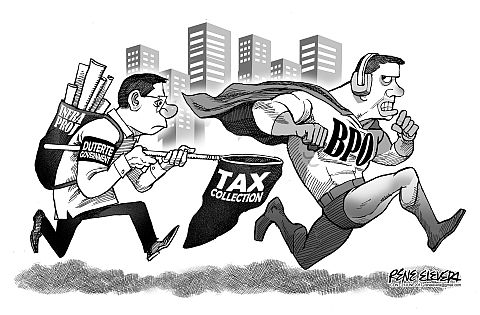
Reducing income tax by letting the rich pay more and imposing higher taxes on items considered as luxuries or harmful to one’s health — including a proposed tax on salted canned food — are at the core of the simple tax strategy plan followed by the Duterte administration, and it’s producing mixed reactions.
Also included in the tax penalty are the business process outsourcing (BPO) companies and the cooperatives, which help augment the income of its members and provide alternative livelihood options for them.
Instead of lobbying for outright exemption, the BPOs are seeking an alternative plan and asking the government to provide tax incentives for them in exchange for expanding their branches outside the metropolitan areas.
There are actually a lot of BPO offices outside of Manila, with Cebu and Davao among the leading destinations for these services, but the countryside is a different story.
Obviously, there isn’t enough of an infrastructure network to draw these investors to the countryside, which had also turned to tourism to augment the income of the residents.
Maybe the seemingly unconnected mix of tourism and BPOs that had worked in the urban areas can do its magic in providing alternative employment to residents aside from the usual staples of farming and fishing.
Then again, the idea of bringing the kind of development being taken for granted by urbanites into the countryside isn’t a novel one at least as far as Cebuanos are concerned, who are familiar with the “promdi” (from the province) gospel of former Cebu governor Lito Osmeña — not the gun-toting probinsyano a la Coco Martin in that eponymous TV series adapted from a movie by the late acting legend Fernando Poe Jr.
Alas, the bulk of the government’s “build, build, build” infrastructure program is primarily — some say inordinately and unfairly — concentrated in the country’s capital of Manila that is overpopulated and suffering from its worst traffic crisis in its local history.
If businesses such as BPOs would relocate and/or expand their operations to the countryside, it may be worth it provided that they also receive infrastructure support such as a reliable telecom backbone and speedy WiFi connections.
As seen in Metro Cebu and other parts of the country, the growth of BPO industries had resulted in other businesses also thriving alongside them, particularly restaurants and even local eateries.
But would tax incentives be enough to convince them to pursue expansion and would the Duterte administration, already challenged enough to be creative in keeping its lower income tax promise a reality, be willing to accept the BPOs’ request?
That’s something the BPO industry needs to seriously pursue if it intends to continue becoming a major contributor to the country’s economy.